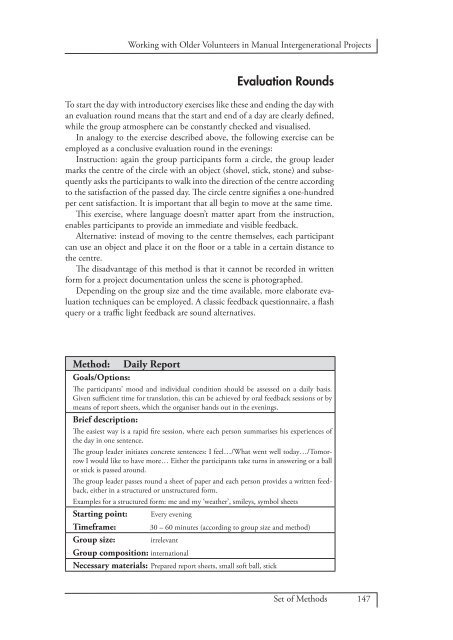Download - TRAMP - Arbeit und Leben DGB/VHS
Download - TRAMP - Arbeit und Leben DGB/VHS
Download - TRAMP - Arbeit und Leben DGB/VHS
Create successful ePaper yourself
Turn your PDF publications into a flip-book with our unique Google optimized e-Paper software.
Working with Older Volunteers in Manual Intergenerational Projects<br />
Evaluation Ro<strong>und</strong>s<br />
To start the day with introductory exercises like these and ending the day with<br />
an evaluation ro<strong>und</strong> means that the start and end of a day are clearly defined,<br />
while the group atmosphere can be constantly checked and visualised.<br />
In analogy to the exercise described above, the following exercise can be<br />
employed as a conclusive evaluation ro<strong>und</strong> in the evenings:<br />
Instruction: again the group participants form a circle, the group leader<br />
marks the centre of the circle with an object (shovel, stick, stone) and subsequently<br />
asks the participants to walk into the direction of the centre according<br />
to the satisfaction of the passed day. The circle centre signifies a one-h<strong>und</strong>red<br />
per cent satisfaction. It is important that all begin to move at the same time.<br />
This exercise, where language doesn’t matter apart from the instruction,<br />
enables participants to provide an immediate and visible feedback.<br />
Alternative: instead of moving to the centre themselves, each participant<br />
can use an object and place it on the floor or a table in a certain distance to<br />
the centre.<br />
The disadvantage of this method is that it cannot be recorded in written<br />
form for a project documentation unless the scene is photographed.<br />
Depending on the group size and the time available, more elaborate evaluation<br />
techniques can be employed. A classic feedback questionnaire, a flash<br />
query or a traffic light feedback are so<strong>und</strong> alternatives.<br />
Method: Daily Report<br />
Goals/Options:<br />
The participants’ mood and individual condition should be assessed on a daily basis.<br />
Given sufficient time for translation, this can be achieved by oral feedback sessions or by<br />
means of report sheets, which the organiser hands out in the evenings.<br />
Brief description:<br />
The easiest way is a rapid fire session, where each person summarises his experiences of<br />
the day in one sentence.<br />
The group leader initiates concrete sentences: I feel…/What went well today…/Tomorrow<br />
I would like to have more… Either the participants take turns in answering or a ball<br />
or stick is passed aro<strong>und</strong>.<br />
The group leader passes ro<strong>und</strong> a sheet of paper and each person provides a written feedback,<br />
either in a structured or unstructured form.<br />
Examples for a structured form: me and my ‘weather’, smileys, symbol sheets<br />
Starting point: Every evening<br />
Timeframe: 30 – 60 minutes (according to group size and method)<br />
Group size: irrelevant<br />
Group composition: international<br />
Necessary materials: Prepared report sheets, small soft ball, stick<br />
Set of Methods 147


